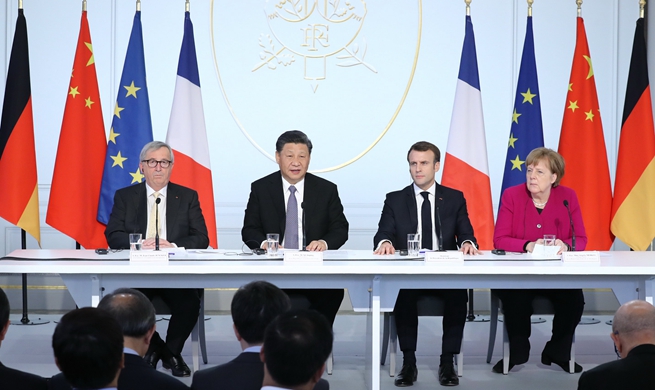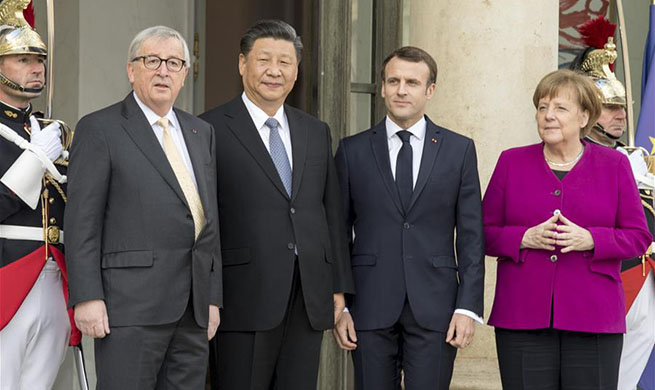by Alessandra Cardone
ROME, March 27 (Xinhua) -- The Italian economy would exit recession during 2019, if only by a very small margin, a report by an economic think tank forecast on Wednesday, on the same day as the country's central governor warned structural reforms were urgent.
"In a context of slowing global growth, Italy overcomes the technical recession with no change in gross domestic product (GDP) in the first quarter of 2019," Bologna-based think tank Prometeia stated in its Quarterly Economic Outlook.
Thanks to this slight improvement, the think tank said a corrective budget action by the Italian government would be needed for the current year.
"Italy moves towards the real challenge, that is the budget law for 2020," Prometeia said.
The Italian economy -- the third largest in the euro-zone -- decreased by 0.1 percent in the last quarter of 2018 (corrected from a previous 0.2-pct estimate) compared to the previous one, according to the National Institute of Statistics (ISTAT).
It had already posted a 0.1 percent GDP drop in the third quarter of last year, and the two consecutive negative quarters marked a technical economic recession.
Now, the Italian GDP was expected to expand by merely 0.1 percent throughout 2019, and by 0.7 percent in 2020, according to Prometeia experts, who noted that the country was still under the carry-on effects of the 2018 recession.
"Actually, Italy has entered 2019 with a negative growth, due to a mix of global and domestic factors," Stefania Tomasini, Prometeia Head of Italian econometric models, told Xinhua.
"The global economic slowdown has weighed, and especially its impact on Germany, which is a crucial partner for the Italian economy."
"Adding to this, there was a decline in the global automotive industry," she said.
A second factor behind the modest 0.1 percent growth forecast by Prometeia for 2019 was "uncertainty at political level, related to the government's fiscal policy, and the recent tensions with (European authorities in) Brussels on the budget approval."
"Now, we foresee a flat first quarter, and a modest recovery in the following quarters of 2019, but with the economy still feeling the effects of the recession," Tomasini explained.
STRUCTURAL REFORMS NEEDED
Bank of Italy's governor Ignazio Visco provided a similar perspective on Wednesday, while urging structural reforms.
"The slowdown registered in the last part of 2018 is confirmed in the first months of this year," the governor said, as he addressed the 12th MAECI(Ministero degli Affari Esteri) -- Bank of Italy Conference at the Foreign Ministry in Rome.
Visco stressed Italy, as well as other advanced economies, urgently needed more actions "to better fight the economic slowdown and the increase in poverty."
"A temporary relief to the economic situation is not enough to create stable job opportunities, and structural reforms -- at the core of the (Italian) public debate for years -- must be added to traditional redistributive provisions," Visco told the conference.
He added Italy also needed "to ensure financial stability, having in mind a clear and credible strategy for cutting the weigh of public debt on our economy in the medium term."
Finally, Italy's major industrial association Confindustria forecast the GDP would remain unchanged in 2019, as such reducing its previous prediction of a 0.9 percent annual growth.
"The Italian economy is expected to substantially stagnate in 2019, and to improve slightly in 2020," Confindustria Study Center stated in a report on Wednesday.
"Compared to the forecast made in October 2018, growth is clearly revised downwards this year: (this is) due for three-quarters to a lower domestic demand, and for one-quarter to foreign demand."
The industrial association said it had already warned in October about a series of domestic and global risks for the Italian economy, and "some of these later materialized."
"In particular, a budget that is not enough growth-oriented, and no clear evidence of a reduction in debt-GDP ratio, with unavoidable repercussions on the power of attraction of Italian bonds on financial markets," Confindustria explained.
Two further risk factors concretely affecting Italy in the way the association had anticipated were a decline in domestic household consumption -- combined with a rise in propensity to save -- and a difficult phase for the European car market linked to the threat of U.S. duties.
The official forecast of the Italian government, as in the budget passed in December, was of a 1.0 percent economic growth in 2019.



















